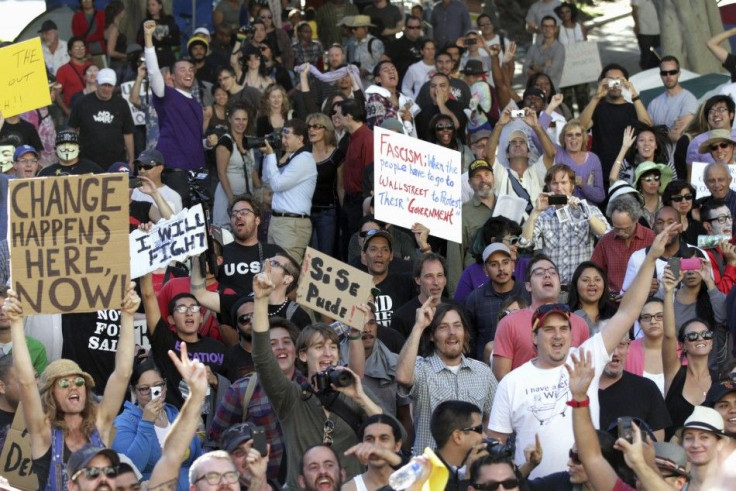Occupy Wall Street: Is It Time for a Public Bank?
OPINION

Unconventional times require unconventional measures.
During his historic and successful response to the Great Depression, President Franklin D. Roosevelt declared a bank holiday in 1933 to help end a panic and to reorganize the nation's banking system.
Among other provisions, the act allowed only U.S. Federal Reserve-approved banks to operate in the United States of America. Later, the Banking Act of 1933 would establish the Federal Deposit Insurance Corporation (FDIC), which, among other changes, insured personal savings accounts up to a set dollar amount.
In other words, with Roosevelt's FDIC, the American people -- for the first time in the modern era -- got the piece of mind of knowing that their money deposited in a local bank was safe: no misdeeds or errors by a banker would result in John and Jane Smith losing their hard-earned savings.
To be sure, FDR's move was an unconventional stance, but it addressed a serious problem and solved it.
A Public Bank
That begs an obvious question: is it time for another unconventional response today? Specifically, regarding the banking sector?
Indeed it may very well be.
One major protest point/concern expressed by Occupy Wall Street is that in the response to the financial crisis, the affected major U.S. banks were bailed out, but the American people were not. The typical person got left holding the bag, if you will: the bill. Occupy Wall Street is correct.
Or in the words, as the wonderful New York Times Business Columnist Floyd Norris put it, The financial crisis is one of those instances in which justice and success don't come together.
The U.S. Government chose success, and don't let anyone tell you otherwise: the bank bailout and related interventions were successful: the global financial system did not collapse. Your ATM worked throughout the crisis. The western world did not suddenly revert to the barter system.
But the bank bailout also contained mistakes and flaws, and along the way -- you guessed it, and as Norris outlined -- the banks got rich. Or should one say richer. And justice was sacrificed.
Occupy Wall Street Says: Now It's Time For The Justice
Now the Occupy Wall Street movement has risen to remind us all that justice still must occur. The group has not issued a formal list of demand yet, but here's one to consider: a public bank.
Here's how it would work: a new, federal bank would be established to provide every citizen with a savings account, checking account, and debt card/online banking. Bank employee salaries would be modest -- there would be no $1 million bank executives or other layers of bank excess and waste. It would pay only a modest amount of interest and there would be only a modest fee for selected transactions. Some investments would be made in U.S. Treasuries and other public sector bonds to cover the bank's operating costs. All deposits would be insured.
In a nutshell, the bank would serve the banking needs of the people, not shareholders or executives, as private banks do.
Those who want higher returns on their deposits and more sophisticated banking services can deposit money in a typical, private sector bank. But there would be no FDIC insurance.
Most importantly, the new, federal bank would enable tens of millions of poor and working Americans to access banking services for very low cost -- and not be burdendown by fees and charges thatt enrich bank executives or shareholders at the expense of the public interest. The new public bank would alsol free-up literally hundreds of billions of dollars currently wasted on bank fees and unreasonable charges -- money that can be put to better use in the community and in businesses.
Second, the bank probably would not need a bailout because its operations would be limited to serving the basic needs of its depositors -- it would not be permitted to make speculative investments, or other outlandish loans/deals.
In other words, it would be a bank of the people, by the people, for the people.
Private banks would still be able to make outlandish loans and deals, it's just that there would be no federal bail outs and depositers would lose their dough, along with stockholders, too, if the private bank failed. In other words, the era of head the banks win, tails the taxpayer and the public loses, would be over. At the public bank, banking would become boring again -- the way it should be.
What's more, the public bank would not address any of Occupy Wall Street's other points, including increasing taxes on the rich/upper income groups, passing a comprehensive infrastructure bill to create jobs, protecting Social Security and Medicare, strengthening unions and collective bargaining, or achieving debt relief for middle/working class citizens, and the poor. Those are separate issues requiring distinct public policy reform efforts.
One other OWS point the public bank would address: it would end some corporate welfare and related programs.
Best Name for The Public Bank
Yours truly has thought about the best name for the new publicl bank. Perhaps the United States Citizens Bank. Or the Bank of the People of the United States. Or Public Bank.
The Bank of Lincoln would be suitable, but there are so many banks in the U.S. named after the great Mr. Lincoln that it wouldn't be right to take away some other institution's branding niche.
Here's another public bank name that just came to mind: Occupy Wall Street Bank.
It has a nice ring to it.
© Copyright IBTimes 2024. All rights reserved.











